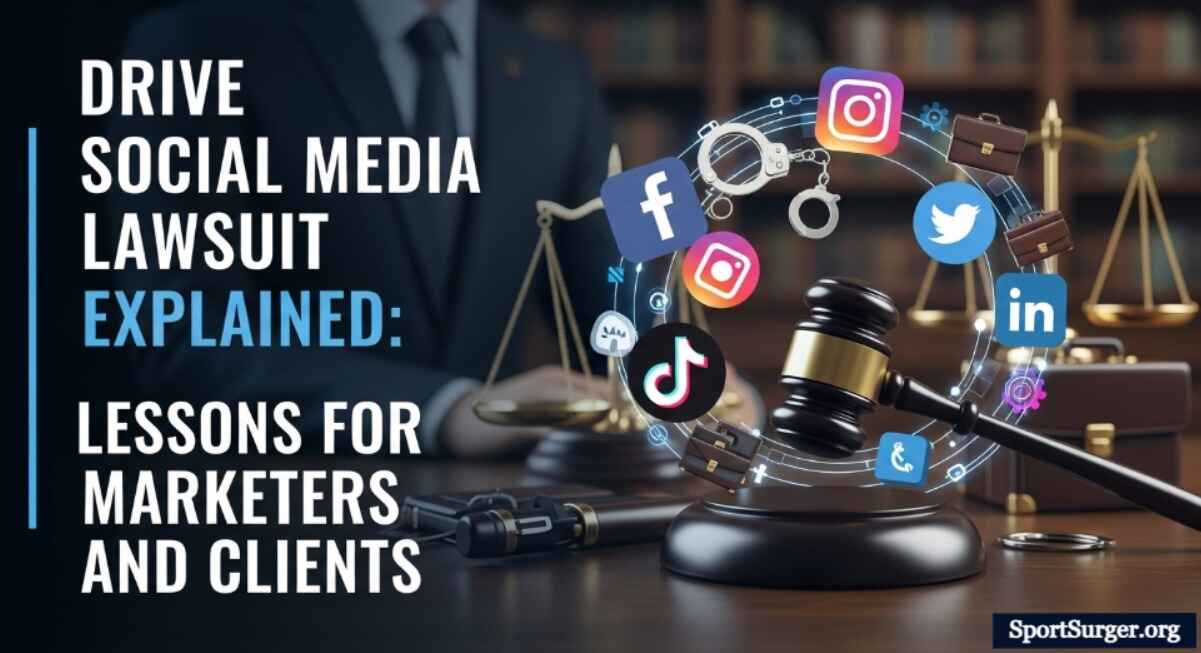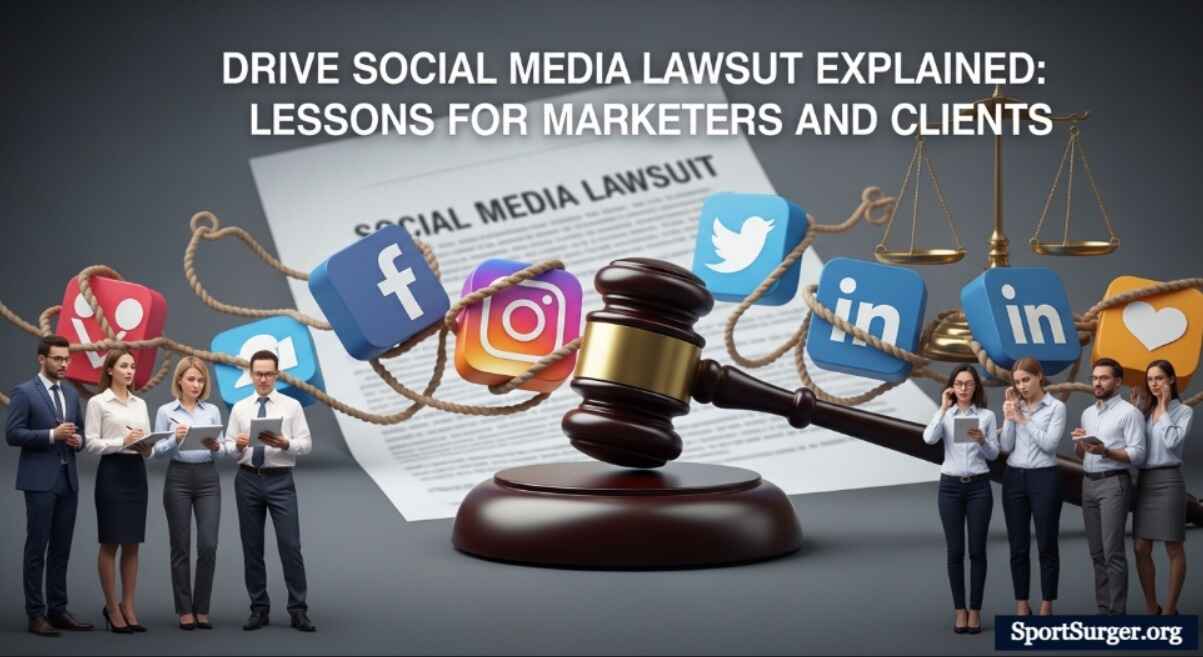Introduction
In recent years, lawsuits involving digital marketing agencies have captured the attention of both businesses and consumers.
Among these, the Drive Social Media lawsuit stands out as a case that has sparked significant discussions about advertising practices, client relationships, and accountability in the digital marketing industry.
Businesses invest heavily in social media marketing to expand their reach, build brand awareness, and drive sales.
But what happens when expectations are not met, or when contractual disputes arise?
The Drive Social Media lawsuit offers insights into these issues, making it a topic of interest for entrepreneurs, marketers, and legal professionals alike.
This article provides an in-depth exploration of the Drive Social Media lawsuit, including its background, allegations, legal arguments, industry implications, and what businesses can learn to protect themselves in the digital age.
Understanding Drive Social Media

Drive Social Media is a marketing agency that specializes in helping businesses grow through social media advertising. Founded with the mission of providing measurable marketing results, the agency emphasizes data-driven strategies and creative campaigns.
Over the years, Drive Social Media has worked with clients from various industries, offering services such as:
- Social media ad campaigns (Facebook, Instagram, TikTok, and more)
- Brand development and positioning
- Content creation and video production
- Analytics and performance reporting
The company’s bold claims about its ability to deliver results have made it popular among small and mid-sized businesses. However, this strong marketing approach has also led to disputes when outcomes failed to align with client expectations—setting the stage for legal action.
The Drive Social Media Lawsuit
The Drive Social Media lawsuit centers on disagreements between the agency and its clients, with some claiming that the services delivered did not match contractual promises or advertised results. While details vary by case, the most common allegations include:
- Misrepresentation of Results – Clients claimed that the agency overstated the outcomes of its strategies.
- Breach of Contract – Disputes arose regarding contract terms, particularly about deliverables, timelines, and refund policies.
- Unfair Business Practices – Some alleged the use of aggressive sales tactics or unclear contract language.
- Transparency Issues – Questions emerged about reporting accuracy and whether clients were given a clear picture of campaign performance.
The lawsuit highlights the growing tension between marketing promises and real-world results, an issue that resonates with many businesses navigating the digital advertising landscape.
Key Legal Arguments in the Drive Social Media Lawsuit
1. Contractual Obligations
Contracts form the backbone of any client-agency relationship. In the Drive Social Media lawsuit, much of the legal battle revolved around how terms were defined, communicated, and executed. Clients argued that vague language created room for unmet expectations, while the agency emphasized that performance can never be guaranteed in marketing.
2. Misrepresentation and False Advertising
One of the central claims was that clients were misled about potential results. Courts often assess whether marketing statements qualify as “puffery” (general promotional language) or factual misrepresentation. This distinction is crucial in determining liability.
3. Consumer Protection Laws
Depending on jurisdiction, consumer protection statutes may apply to business-to-business transactions if misleading practices are alleged. The lawsuit’s interpretation of these laws could set precedents for how marketing agencies operate.
4. Damages and Remedies
Plaintiffs sought compensation for financial losses, arguing that ineffective campaigns and unmet promises harmed their businesses. Remedies considered included monetary damages, contract termination, and, in some cases, public accountability.
Industry Impact of the Drive Social Media Lawsuit
The case not only affects Drive Social Media but also reflects broader challenges in the digital marketing industry.
Shaping Marketing Accountability
The lawsuit raises questions about how transparent agencies should be in communicating expected outcomes. Agencies may need to adopt clearer reporting methods, realistic performance benchmarks, and more transparent contracts.
Trust in Client-Agency Relationships
When trust is broken, the damage extends beyond one company. The lawsuit underscores the importance of setting realistic goals and managing expectations up front.
Legal Precedents for Marketing Agencies
If courts side with plaintiffs in cases like this, it could create stronger legal obligations for marketing firms to prove claims and ensure advertising practices comply with business laws.
Lessons Businesses Can Learn from the Drive Social Media Lawsuit
The Drive Social Media lawsuit is more than just a legal battle—it is a learning opportunity for both agencies and clients.
For Businesses Hiring Marketing Agencies
- Review contracts carefully – Ensure terms are clear about deliverables, timelines, and payment structures.
- Demand transparency – Ask for detailed reporting and access to campaign data.
- Set realistic expectations – Marketing is not a guaranteed formula; success depends on various external factors.
- Seek references – Look at reviews, case studies, and third-party feedback before committing.
For Marketing Agencies
- Communicate clearly – Avoid overpromising and use transparent language.
- Provide proof of performance – Support claims with case studies, verified data, and measurable KPIs.
- Invest in client education – Help clients understand how digital marketing works, including risks and limitations.
- Strengthen contracts – Clearly define terms, refund policies, and service limitations.
Expert Opinions on the Drive Social Media Lawsuit

Legal experts suggest that the case emphasizes the fine line between ambitious marketing and false advertising. Business consultants point out that lawsuits like this erode industry trust but can also encourage healthier practices. Marketing professionals highlight that success lies in aligning creative strategy with data transparency.
Potential Outcomes of the Drive Social Media Lawsuit
While lawsuits may take years to resolve, some potential outcomes include:
- Settlement agreements – Agencies may choose to settle disputes privately to avoid reputational damage.
- Court rulings – A judgment could set binding precedents for future marketing-related disputes.
- Industry reforms – Agencies might adopt stricter compliance policies to prevent similar cases.
Conclusion
The Drive Social Media lawsuit sheds light on the challenges of balancing bold marketing promises with achievable results. It underscores the importance of clear contracts, transparent practices, and realistic expectations in the client-agency relationship.
For businesses, the key takeaway is to remain informed, ask the right questions, and hold partners accountable. For agencies, it is a reminder that trust, transparency, and integrity are the foundation of long-term success in the digital marketing world.
As the case unfolds, its lessons will likely shape not only Drive Social Media’s future but also the broader standards of the marketing industry.
FAQs
What is the Drive Social Media lawsuit about?
It involves disputes between the marketing agency and its clients, centering on allegations of misrepresentation, breach of contract, and lack of transparency.
Who filed the Drive Social Media lawsuit?
Various clients raised claims against the agency, though the details differ depending on the specific case.
How does the lawsuit affect other businesses?
It serves as a warning for businesses to carefully vet contracts, manage expectations, and demand transparency from marketing partners.
Could this lawsuit change how marketing agencies operate?
Yes, it could push agencies toward clearer contracts, better reporting, and more cautious promises to avoid liability.
What can clients do to protect themselves?
Clients should thoroughly review contracts, seek independent advice, and track campaign performance to ensure accountability.

